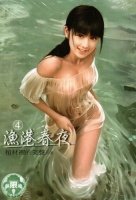- 第
- I
- [II]
- [III]
- ... [IV]
- ... [VII]
- ... [10]
- ... [XIII]
- ... [XVI]
- ... [IXX]
- ... [XXII]
- ... [XXV]
- ... [XXVIII]
- ... [XXXI]
- ... [XXXIV]
- ... [XXXVII]
- ... [40]
- ... [XLIII]
- ... [XLVI]
- ... [IL]
- 页
桂枝香 Gui Xiang
浣溪沙 Huan Xisha
南乡子 Tone of the South
渔家傲 Yu Jia Ao
菩萨蛮 Song Form
千秋岁引 Qian qiusui casue
菩萨蛮。集句 Song Form cento
明妃曲二首 Ming Fei Qu 2
书湖阴先生壁 Book Lake Yam Baas wall
棋 chess
登飞来峰 Teng klippe
泊船瓜洲 Berthing guazhou
春夜 Spring Evening
葛溪驿 Ge River Relay
示长安君 instruct Chang'an don
渔家傲(二之一) Yu jia ao twain gospel
清平乐 Qingping Yue
诉衷情(和俞秀老鹤词·五之一) Complain heartfelt emotion Yu Xiu-old crane and five words gospel
诉衷情(五之二)
诉衷情(五之三) Complain heartfelt emotion E ter
诉衷情(五之四) Complain heartfelt emotion Five of the four
诉衷情(又和秀老·五之五) Complain heartfelt emotion Five of Five further and show
南乡子(二之一) Tone of the south twain gospel
浪淘沙令
| 多首一页 |
春夜
王安石
金炉香尽漏声残,剪剪轻风阵阵寒。
春色恼人眠不得,月移花影上栏杆。
春色恼人眠不得,月移花影上栏杆。
【白话文】 夜已经深了,香炉里的香早已经燃尽,漏壶里的水也快漏完了。
后半夜的春风给人带来阵阵的寒意。
然而春天的景色却使人心烦意乱,
只看见随着月亮的移动,花木的影子悄悄地爬上了栏杆。
【注释】 尽:一作烬
(1)漏:古代计时用的漏壶。
(2)翦翦:形容初春的寒风削面,尖刻刺骨。
【北美枫文集】千家诗

